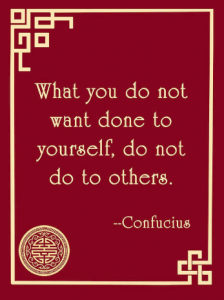A few years back an acquaintance called me to ask for help finding a job; s/he’d been let go after a merger.
While we had known each other for some time professionally I’d always found him/her to be hard to reach, not responsive, and somewhat arrogant. When s/he needed something, the expectation was I – and no doubt others – would respond fully and immediately.
Now s/he was reaching out for help. And again the expectation was a full and immediate response.
I attempted to gently inform the person that they were in a different position now, and would make a lot more progress – and get a lot more help – if they handled things a little more diplomatically. I won’t characterize the response, as I may have misinterpreted it.
I sort of understand this; as a buyer, the person was used to being accommodated – if not outright fawned over – by vendors eager to curry favor. The golden rule applied – S/he who has the gold rules.
As I think back on this, I recall being in meetings with this person where vendors were told to improve results. When those vendors attempted to meet his/her needs by suggesting program changes, IT connection improvements, or different communications procedures, the answer was always the same – we don’t have the resources to do that, that’s your responsibility, you figure it out.
The net is this. Buyers do not help themselves by bossing potential vendors around, being unnecessarily difficult, demanding, unrealistic and dictatorial. And, often vendors can’t meet certain objectives unless the client pitches in as well. Sure, every payer has limits, resource restrictions, and budget constraints, but expecting a vendor to deliver data to your system seamlessly, consistently, and accurately while refusing to upgrade your technology to allow that is not only unrealistic, it is certain to fail.
That’s on the business side.
On the personal side, individuals who conduct themselves this way may well find things change when they no longer “have the gold”. Their calls go unanswered, references aren’t provided, job leads not shared.
What does this mean for you?
Many vendors have excellent ideas they’ve learned from working with other payers, ideas that can make your program more effective, efficient, impactful. Ask them what you can do to better work together.
And remember the real golden rule –




Couldn’t agree more, Joe. Remind me next time I see you….I have a very similar story.
So true Joe. Wouldn’t the world be a better place if everyone remembered that rule. We all know several people who treated others like dirt then reached out to those same people for assistance when their job situation changed. Karma is a bitch.
Thanks, Joe. Vendors are our partners to reach our goals, are an extension of services provided to clients and injured workers, and are primarily great people to be part of our team to explore the best solutions for all people/team members involved.
I have been in both roles. A manager who purchased from various vendors. and a I currently work for a vendor. In either role I have viewed at it as a business partnership, not a dictatorship. It is about respect..
Excellent post which we should apply in all our relationships. I do though prefer the Mathew 7:12 version, “So whatever you wish that others would do to you, do also to them.”
A wise man once said “Two things will define you, 1) Your patience when you have nothing, and 2) Your attitude when you have everything. “
Joe, I always appreciate your honesty and integrity. YOu are right on. Living the good life to me means being decent and helpful to others. It not only feels good but it results in lot of good will and friends. BTW, I see Lynn Bui-Carter left a message – Hi Lynn, we haven’t spoken in years but I remember you well.
Solid point and a great reminder to all. We’re in this together…
Joe, this is one of my favorites!